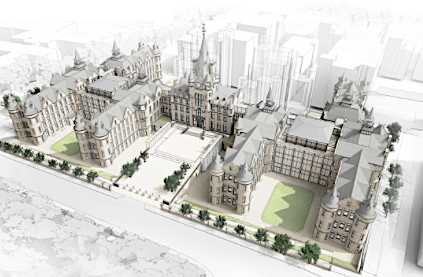The University of Edinburgh said an anonymous donor has pledged £10 million to help transform the city’s former Royal Infirmary into a state-of-the-art home for the Edinburgh Futures Institute.
The gift is the biggest ever capital donation to the University of Edinburgh.
The Institute will be one of the largest centres for interdisciplinary learning and research in Europe.
“We are deeply grateful for this visionary gift to the University, which will help us to create a truly exceptional teaching and research environment within the Edinburgh Futures Institute,” said Professor Sir Timothy O’Shea, Principal of the University.
“The Institute will challenge us to think differently about how we can affect change, both locally and globally.
“By marrying our world-class expertise in the humanities, arts and social sciences with our sector-defining research in new data technologies, it will produce practical solutions and new approaches for the common good.
“This generous gift will help realise this vision.”
The university has appointed Faithful+Gould as project managers, Bennetts Associates as architects, and Consarc as conservation architects. Construction work has begun on site.
Rab Bennetts of Bennetts Associates said: “Transforming the Category A-listed Royal Infirmary into the University’s Edinburgh Futures Institute is an incredibly important project for the institution and for the city.
“The building is one of the top-ten listed buildings in Edinburgh.
“It has enormous potential for rejuvenation, providing a completely new and more open identity, especially with a public square on Lauriston Place.”
Vice-Principal Professor Dorothy Miell, Head of the College of Arts, Humanities and Social Sciences, said: “At the Institute researchers will, for example, consider how areas such as theology can help tackle climate change or what business management can do to alleviate the refugee crisis.
“They will also grapple with ways in which lawyers can foster creativity and reflect on how design informatics can tackle inequality.
“The Institute will play an important part in ambitious plans to make Edinburgh and its surrounding area the data capital of Europe.
“The world is experiencing major changes: climate volatility, political discontent, advances in artificial intelligence, economic upheavals.
“This presents big challenges. We need different ways of thinking about these issues and of devising new solutions. Edinburgh Futures Institute will make that difference.
“It will blend theoretical and practical knowledge.
“It will work with organisations dealing directly with these challenges and curate meaningful interactions between seemingly disparate disciplines.
“We want our students to embody this approach and our partners to share the vision and help us to develop it.”
